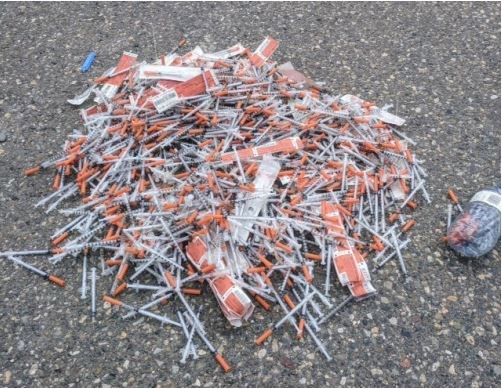An indication of the uphill battle advocates have in fighting for safe injection sites was on display Thursday at a town hall organized by Sudbury MPP Jamie West.
As Ariella Zbar, Public Health Sudbury & Districts' associate medical officer of health, was making a point, a man in the crowd of 50 or so spoke and said the sites only encourage addicts, adding to the crisis gripping North America.
“If they’re allowed more, they will do more,” the man said.
Not so, Zbar replied. While they don't decrease usage, studies have shown that safe sites don't increase addictions. In fact, they allow addicts to access treatment and education, she said, and prevent infections, diseases and overdoses.
“The point of harm reduction is not to prevent drug use, it is to prevent drug related harms,” she said, after speaking at the meeting, held in the United Way office on Cambrian Heights. “It's meeting people where they're at. If they want to continue using, they continue using in a safe way.
“It gives them a safe place to do that, be accepted for who they are and access services that are so often denied, again, because they are such a stigmatized population.”
No one is arguing that injection sites are a solution, Zbar said. Really addressing the issue is going to take an entire community effort, with groups working together on a collective strategy.
“So supervised (injection sites) are just one part of the picture. I think that's the important takeaway here.”
Julie Gorman, program co-ordinator with Sudbury Action Centre for Youth, outlined for the crowd just how diverse addicts are, ranging from youth who get hooked as young as 13, to older people battling chronic pain.
“None of the people chose to become addicted to opioids,” Gorman said.
Vulnerable populations, however, are more likely to have issues with drug use. Gorman said around 60 per cent of sex trade workers, for example, regularly use opioids.
It's easy for the public to discount them, she said. Downtown, for example, users are being pushed out of visible areas and workers are now finding needles in dangerous areas, such as waterways and electricity boxes.
“Remember, it’s not just Sudbury” dealing with the crisis, Gorman said. “It’s Canada and the world – everywhere.
“We’re trying to lift (addicts) up. We’re out there trying to help them as a person … (but) we need a community buy in.”
Zbar said a safe injection site would help get addicts off city streets, and reduce the alarming number of discarded needles found downtown and other areas.
“If the individuals who do discard (needles) in the community are able to use them in a supervised site, that means it's not on the streets. It also means they're not overdosing. If they're not in a safe and supervised place, they will die or end up in hospital.”
And that only adds to emergency room overcrowding, Zbar said.
For his part, West said he hoped Thursday's meeting will lead to more discussion on what we can do as a community to address the crisis. While some people reach for simple solutions like jailing addicts, he said they know that doesn't work and only clogs the already busy justice system.
“It's a more complicated conversation than that,” West said. “So we thought, let's get some people who are experts and let's open it to the community for education.
“We're planning more of these ... just to get the information out there, to help people understand what's going. It's a crisis, as one speaker said, it affects everybody, all socio-economic (classes), males, females, young and old.”
As far as solutions go, West said they're still a long way off.
“I think we're in the early stages,” he said. “I think for a long time, people ignored it until they started to notice it near where they live, or it affected someone they knew.
“There's no silver bullet, but I think this is a good first step.”
More information on Greater Sudbury's community drug strategy can be found on Public Health's website.
